How major podcast players are moving ‘beyond’ audio formats
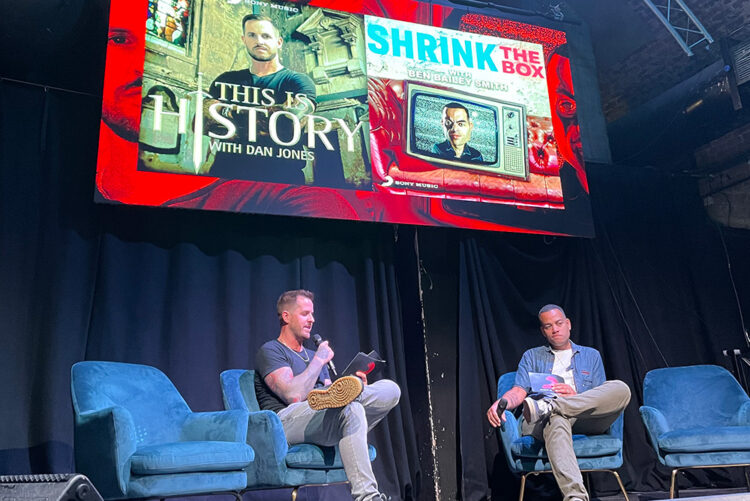
Feature
Podcast creators and platforms are now looking beyond the sector, with ambitions to muscle in on live events, or striking licensing deals with film and TV networks.
The narrative around the business of podcasting seems to change significantly from year to year.
At yesterday’s IAB Podcast Upfront in London, the key message from the sector’s main players was about the audio channel was, in fact, going “beyond audio”.
That’s quite a departure from when The Media Leader attended the same conference two years ago, when companies were keen to talk about the innovative contextual, keyword and conversational targeting tools being launched by podcast networks niche engaged audiences and incredible growth podcasting could offer as an emerging channel.
Then, last year, we were told that podcasts were no longer “emerging”. They had emerged. Just like that, all grown up, with accompanying investment, new tools, players and content releases, and that some of its unique power with its audiences was plugging into an intimate audio-only environment.
So podcasting is certainly not standing still, it seems.
Now on its fifth edition, yesterday’s Podcast Upfront, hosted as always by IAB UK CMO James Chandler, who claimed that podcasts were “absolutely at the peak of its powers” and now boasts 5 million podcasts in Europe and growing.
“When you’re thinking about next year, it’s not a nice to have test-and-learn anymore,” Chandler said. “It’s an integral part of your 2024 plan.”
YouTube as the future of podcasts ‘is already here’
Video was mentioned in some form in every presentation. Mike Newman, VP content and partnerships at Audioboom (pictured, right, main image), saying that “the rise of the visualised podcast” was being discussed a lot this year and was largely down to YouTube as a platform, which was “nothing new”.
He added that YouTube, depending on how it was measured, was the second or third biggest podcast consumption platform in the world. As a result, parent company Alphabet had decided to shut down Google Podcasts and move this podcast audience over to YouTube Music.
“The talk is whether YouTube will be the future podcasting. I think it kind of already is and we know that because we’re here, and we’re doing it and it really does work and I think that it’s going to become probably 2024 the story for podcasting,” Newman (pictured below, right) commented.
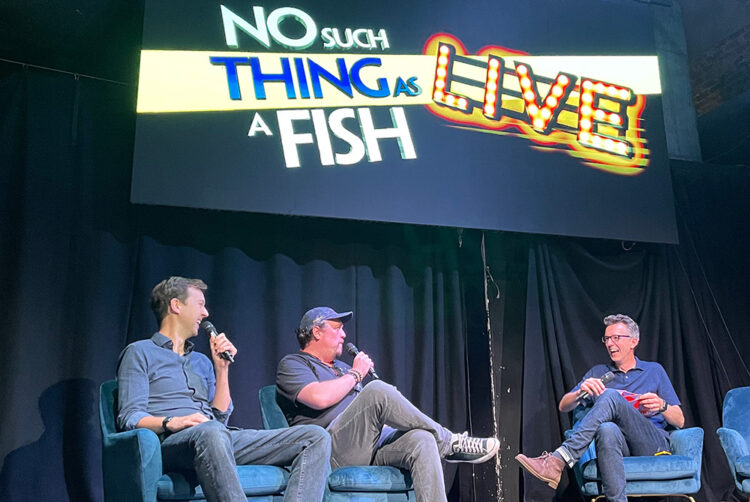
Visualised podcasts already deliver “a huge amount of audience share” on YouTube, Newman stressed, citing five podcasts on its network which through one episode get more than two million YouTube Views which would only be accessible through Audioboom.
In an conversation with Chandler at the end of his session, Newman predicted for next year: “I hope that we can stop talking about whether the video podcast is a podcast. Who cares if the listener or viewer says it is a podcast, that’s the important thing.”
How is podcast advertising getting to the next level in 2023?
Podcasts for film, TV and live events
Increasingly podcast creators and platforms are looking to make content that can be used for live events, or sold to film and TV networks.
Nicole Gardner, UK head of sales at Wondery, said it was the podcast studio that seen more of its shows “go from headphones to Hollywood” with more than 25 projects sold to networks, streamers, and studios, including Apple TP, Prime Video, and Sky. One example is Dr Death which currently has series 2 in post-production.
Jess Radburn, head of international content at Wondery, added: “The ability to take our shows beyond audio to other formats and the quality of our storytelling is what sets us apart.”
Global’s head of podcast sales Sarah Ray echoed talk of film and TV as she confirmed it was having “several discussions” around its titles for TV and film adaptations, like Hunting Ghislaine and Filthy Ritual. She emphasised that this was going to be a “big focus” going forward.
She explained: “This is a really, really exciting area for TV and for podcasting, and I think it’s really a testament to us as an industry for having an eye and an ear on mesmerising narratives.”
On podcasting and TV habits, Chandler also stated he believed “the influence and power of podcasts” was that it was shaping his media habits; and not just from podcasts made into TV shows or companion podcasts. He referred to an episode of The Socially Distant Sports Bar talking about free diving inspiring him to watch Netflix documentary The Deepest Breath. And Bad Blood: The Final Chapter about Elizabeth Holmes and Theranos leading to a binge of The Dropout on Disney+.
Many presentations at the IAB Podcast Upfronts also mentioned podcast live events to some degree; whether these were in-person as was the case for How To Fail, No Such Thing As A Fish or British Scandal, or streamed live around the world in the case of Morbid.
Podcasts on multiple platforms
Elizabeth Day will join Sony Music Entertainment’s podcast network as of January 2024 after running the weekly podcast How To Fail with Elizabeth Day since 2018. The series currently has more than 200 episodes and 45 million downloads.
She revealed the main reason she is joining the network is amplification and elevation, primarily on digital and social media. She echoed what became a recurrent theme across the event’s sessions: the importance of cross-pollinating podcast content on owned and earned media and having it as a central part of a campaign.
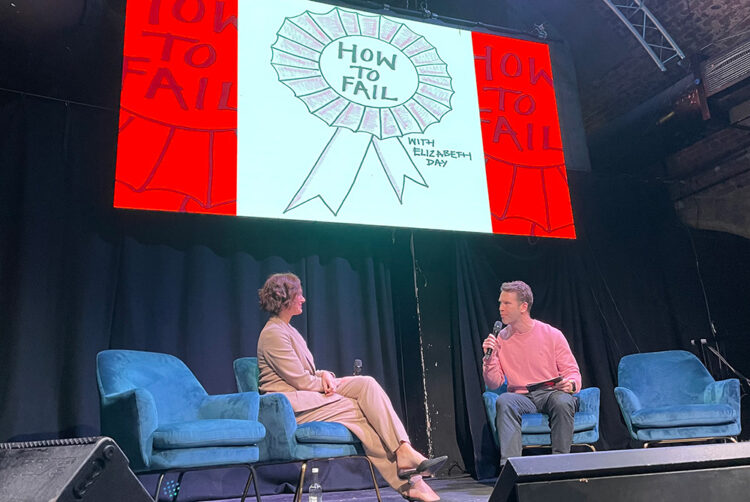
Day explained: “There’s a real opportunity to have amplification and elevation, which I just haven’t had the capacity or the technical skills to be able to do on my own, so I’m really excited about the YouTube channel. We’re going to have the mid-form content, the five- to 10-minute clips that perform really well.”
Along with a new studio and better guests from joining the network, Day also predicts this move and strategy will bring the podcast to “a bigger, wider audience while still retaining the fidelity of our core listenership.”
Representatives from Fresh Air Productions and Auto Trader referred to this when they showcased the multiplatform strategy that put a branded podcast “at the heart” of its communications.
Auto Trader used a two-to-one ratio on promotion to production spending for its podcast Show on the Road, which James Sims Williams, senior creative at the car marketplace platform, called “a significant investment” to help reach an audience that were not the traditional male “petrol heads” it normally speaks to. Auto Trader used its own paid and earned channels to promote the podcast as well as encouraging its celebrity guests to share on their platforms.
Podcasts at 20: What shows do people in advertising and media listen to?
This influence was central to Octave Audio’s presentation with Matt Rouse, podcast lead at the joint ad platform for Bauer Media Audio and News UK, dubbing current times “the age of the podfluencer”.
“These are different from your standard influencers who put things on TikTok for the ‘Lols’, or Instagram for the likes. These are the kinds of influencers that have direct access to your eardrums and the unique ability to connect with you on a deeper level.”
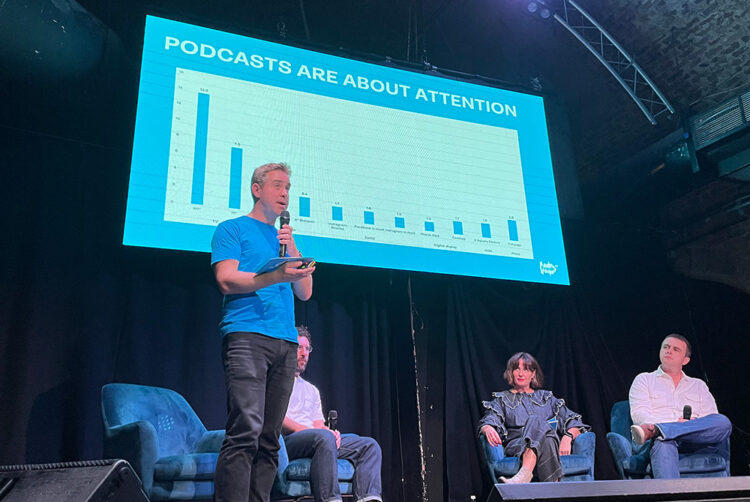
Rouse referred to research that found two-thirds of podcast listeners pay full attention to podcasts and more than 50% of podcast listeners trust advertising more when it’s been endorsed by the hosts.
The importance of integrated campaigns was also referred to in Wondery’s presentation, Gardner added that Wondery being part of Amazon’s network of businesses meant it had more capabilities for innovation and more integrated campaigns.
“From January next year, we’ve got a whole team of Amazon supporting us and working really closely with us. Also the collaboration across Amazon Alexa, Twitch, and Prime gives us so much more so we are not just a podcast platform we are much more than that now,” she said.
Changing podcast behaviours and audiences
Various presentations showed that podcast listeners, or viewers, are showing different behaviours. Some regularly listen to episodes when they drop, others do “deep-dive” binge listening, “skimming” multiple podcasts for different views, or repeat comfort listening of certain interviews or comedy shows.
One behaviour that runs across all of these which was highlighted was that “no one listens to a podcast accidentally”.
Speaking on different podcast behaviours he had seen in his own podcast, Jon Sopel, former BBC North America editor presenter of The News Agents, said: “The average age of the audience watching [BBC News at Ten] on BBC One is over 60. I reckon the average age of our podcast is early 30s. There are huge numbers of young people. The idea that young people aren’t interested in the news of what’s happening in the world is total horseshit. They are interested, they’re just not interested in the conventional way of doing it.”
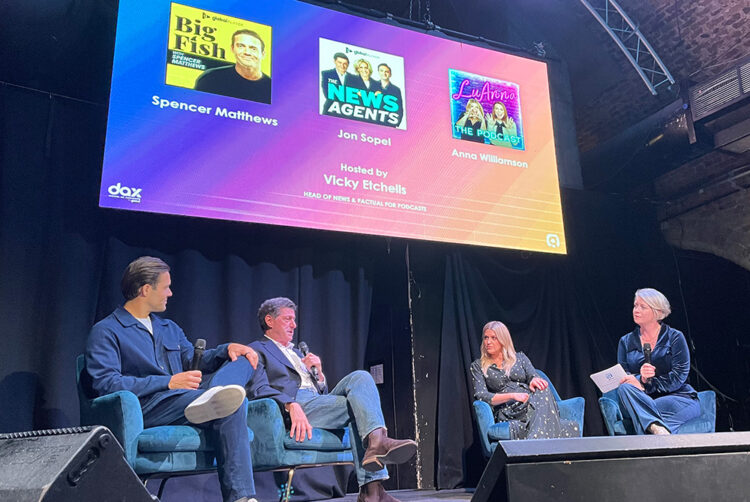
He added: “I think that people are moving away from conventional media. People tell me this and it’s not just with news podcasts. People say to me at six o’clock in the morning I go for the headlines, I get the headlines, and then I want to listen to podcasts. Someone at the Labour Party conference put it rather pretentiously but quite well when he said: ‘I’m not interested in the weather of news, I’m interested in the climate of opinion.'”
Authority and/or authenticity
Coco Khan, co-host of Pod Save The UK, told delegates we were in an “age of authenticity”, when previously authority has been more the focus.
“I have predominantly until this podcast moment been a British journalist, mainly for a paper, mainly for The Guardian, and so quite often, you’re thinking a lot about authority and how you present yourself with authority, but you see now we’re in an age of authenticity and so marrying those two [on the podcast] has been unusual,” she said. “The times have changed and now you can do both.”
Chris Hewitt, host of The Empire Film Pod, said “authority” was what came to mind when thought of his podcast, but also that from day one they wanted to “present ourselves as having a conversation that you want to be part of at the pub”, which involves being open about personal lives and reaching listeners in a way you do not get with other media.
Sopel echoed this as he said: “I spent my whole career in the BBC ensuring that no-one knew a thing about me and you do a podcast, and I think Lewis, Emily and myself kind of think “oh we can show the world more of ourselves”, and suddenly, you’re free to offer opinions, and you bring people in because they feel they get to know you as a result.”
Streaming growth strategies must not rely on consumer complacency



